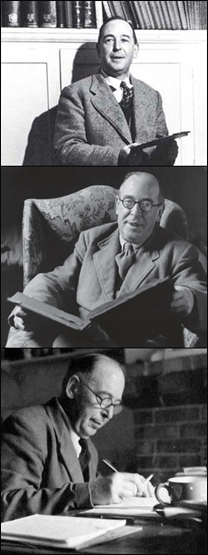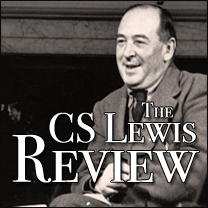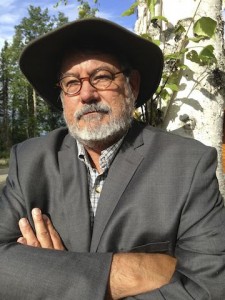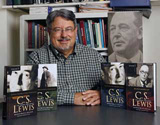
Jack’s Legacy? Timelessness.
June 24th, 2015 | Skip to comments
By Dr. Bruce L. Edwards
Whenever I speak on Lewis, I nearly always am asked to comment on his “legacy.” I realized that I have been talking about Jack’s “legacy,” now, for more than 35 years. The challenge, as I describe below, is that Jack’s legacy keeps growing; he’s not done influencing, educating, challenging, preparing us to live in still future decades and “periods.” Each period, he told us, has its own characteristic blindness in which future inhabitants will ask, plaintively, “But how could they believed that?”
The thing is, time’s arrow shoots forward and backwards, and those future inquisitors will not just be asking why we weren’t as “progressive” as we ought to have been, but also why we didn’t realize how “regressive” we should have been as well, believing in “truths” that were refuted by the ancients long ago. In words, echoing Jack’s wise counsel in The Great Divorce, sometimes you can’t move forward unless you turn back the clock.
The actor, John Cusack, currently playing one half of Brian Wilson in the excellent biopic of the Beach Boys musical genius’s life, Love and Mercy, once referred to Jesus as the “Man with the future in His Eyes.” I like that, especially for its stirring recognition of Jesus as Someone not only who “Was,” but also Who Still Lives, and contains in his very being, the past, the present, and the future. But all of it actually lives in the Now. That is something Jack understood, and he wrote as someone who indeed understood that Truth itself is Timelessness.
Tendering and Tracking Legacies
In September, 1946, Beloit College poet-in-residence, Chad Walsh, published a provocative profile of Clive Staples Lewis in the Atlantic Monthly, bringing to an American readership the first coherent, incisive bio-critical attention to Lewis’s life and work. In it, he documents and contextualizes the rather amazing broadcasting/ publishing exploits of the redoubtable Mr. Lewis, whom Walsh characterizes in his essay as now conducting the “thirteenth year of his one-man campaign to convert the world to Christianity.”
Though his New York Times feature article followed in 1948, Walsh’s book on Lewis, Apostle to the Skeptics (1949), would emerge as the first systematic assessment of Lewis’s apologetics and what we now casually, glibly refer to as “worldview.”
Just one year later in its September 8, 1947 issue, TIME magazine would feature Lewis in a cover story on the Oxford don; below a stylized portrait of Lewis is captioned: “Oxford’s C. S. Lewis . . . His Heresy: Christianity.” Inside, the companion essay, “Don v. Devil,” acknowledges Lewis’s success in “talking theology without pulling a long face or being dull,” noting that he possesses a “talent for putting old-fashioned truth into a modern idiom,” best exemplified from the essayist’s point of view in Lewis’s The Screwtape Letters.
The common assumption at work in these early publications about Lewis is not hard to identify. It is the notion that Lewis’s personal popularity and the size of his readership, astounding as they seemed at that moment from both sides of the Atlantic, were about to crest, and he would remain noteworthy only within a predictable celebrity’s time frame, after which a fickle public would make him yesterday’s news. In fact, when Walsh returned to speculating about Lewis’s “literary legacy” again in 1979, he leveled his own dour forecast that interest in Lewis had “probably peaked.”
Neither the sympathetic Walsh nor TIME’s editors could possibly have imagined that Lewis would continue to enthrall and disciple new readers of all ages and theological persuasions for so many years. Here he is, now well into his 10th decade, still baptizing writers’ imaginations, inoculating seminarians against foolish heterodoxies, and punctuating our pulpiteers’ otherwise bland sermons with metaphorically rich quotations from his works.
The Relevant and the Timeless
“Legacies,” ahem, are for the fading fast, the recently forgotten, or the reluctantly abandoned; a stop-gap to keep them remembered among their peers. Lewis even created a category for the kind of literary genre they inspire: rehabilitations, something he’s never had to undergo, though he’s performed the service himself for as disparate a group of writers as John Milton, Jane Austen, William Morris, George MacDonald, and John Buchan. Lewis is that rara avis who both needs no introduction, and but not even close to needing any kind of dutiful literary eulogy.
Somehow Lewis manages to stay relevant era by era without even bothering to try, and continues to be rediscovered generation by generation, community by community, language by language, and thereby discovered and reinserted into the lives and conversations of Christians, over and over, those who hear in him a winsome voice that gives them the confidence to believe. But it is more than relevance in Jack’s case; it’s the presence of a timeless message that doesn’t go out of date because it is not bound by the clock or the calendar. God’s love exists outside of time, and, certainly, out of place.
So if we shouldn’t settle the “legacy” question just yet (it being way too early), perhaps we can deal with a more important one, in my view, paraphrased from the Psalmist: “Who is C. S. Lewis that we are mindful of him?” I believe answering this question involves less an analysis of individual Lewis works and their impact, valuable as that may be, and, instead, more attention paid to his character, to the kind of person that God—–whom Lewis gleefully referred to as “unscrupulous”—–was creating from the inside out when he commissioned this Belfast-born lad to become one of His more unlikely spokespersons.
Owen Barfield, longtime friend of Lewis, who met him first in 1919, has come the closest to explaining Lewis’s improbably abundant life in a nutshell. In his preface to a volume of essays about Lewis I was pleased to edit, Barfield remarked, “Somehow what Lewis thought about everything was secretly present in what he said about anything.” I think that may be the most apt summary of why Jack enjoys such permanence in our lives.
By this description, Barfield underscores how thoroughly integrated Lewis’s life was—and how evident it was to the people who knew him. It is to say that his life wasn’t compartmentalized or fragmented as he grew to become the person Walter Hooper has called “the most thoroughly converted man” he ever met, one whose whole life, whose entire repertoire of gifts and talents, dreams and visions, were fully yielded to God.
Generous to a fault with his time and money, prayerful, confessional, and evangelistic, a devoted student of Scripture and church history, this “thoroughly converted” Lewis wrote compellingly about the life and imagination of the Christian. His words had authority and presence because he had also lived it deeply and, as we glibly say, “authentically.”
His depth and courage elicits our appreciation; no one does quite what Lewis does. One may choose to be critical, as some evangelicals have been, of his doctrine of Scripture, but it hard to imagine someone who sought harder to obey Scripture than Lewis, nor exhorted others more passionately to rely on it for authoritative guidance. His life corroborates his faith and defines his commitment.
My point is this. What continues to delay the “legacy” of Lewis and brings him new and appreciative readers everyday has only a little to do with what most of us would think of first: it is neither his skillful philosophical argumentation, which is formidable; nor the perspicacity of his reading and scholarship, which is legendary; nor the mythopoeic suggestiveness of his prose, which is masterful.
Rather, it is He whom Lewis has placed at the center of his life that draws us, the One who saved him even as “the most reluctant convert in all of England.” Having equipped Lewis to deploy his polymathic learning faithfully and strategically, God set him loose to deliver eloquently “an answer” for the reason for the hope within him, empowering him to write uncommon, electric declarations like this in a passage from Mere Christianity:
If I find in myself a desire which no experience in this world can satisfy, the most probable explanation is that I was made for another world. If none of my earthly pleasures satisfy it that does not prove that the universe is a fraud. Probably earthly pleasures were never meant to satisfy it, but only to arouse it, to suggest the real thing.
Our Homesickness
This is Lewis’s knowing, gracious appeal to our homesickness, explaining to us what is really going on in our restless hearts, pointing us home to our “true country.” He continues that thought in the same passage:
If that is so, I must take care, on the one hand, never to despise, or be unthankful for, these earthly blessings, and on the other, never to mistake them for the something else of which they are only a kind of copy, or echo, or mirage. I must keep alive in myself the desire for my true country, which I shall not find till after death; I must never let it get snowed under or turned aside; I must make it the main object of life to press on to that other country and to help others to do the same.
This theme is pervasive in everything Lewis wrote post-conversion and forms the basis of whatever his legacy will be. Despite his prodigious talent, or, maybe because of it, Lewis can write genuinely as an “everyman,” with true empathy for our prodigal way, the joy of our return.
The “mere Christian” world Lewis promoted is “bigger on the inside than it is on the outside.” He knew what we most need, what we most want, is “the scent of a flower we have not found, the echo of a tune we have not heard, news from a country we have never yet visited,” and it is his ongoing, sterling testimony that God has provided us this treasure, not only for Lewis, but also for us, in Christ.
Bruce L. Edwards, online editor of this site, is Professor Emeritus of English and Africana Studies at Bowling Green State University in Bowling Green, Ohio. He served as a faculty member and administrator at BGSU for 31 1/2 years. He has served as Fulbright Fellow in Nairobi, Kenya (1999-2000), a Bradley Research Fellow at the Heritage Foundation in Washington, DC (1989-90), and as the S. W. Brooks Memorial Professor of Literature at The University of Queensland, Brisbane, Australia (1988). He has served as a C. S. Lewis Fellow at the Kilns, Lewis’s home in Oxford, on behalf of the C. S. Lewis Foundation, offering seminars on the life, work, and, yes, ongoing legacy of C. S. Lewis.
Bruce was born in Akron, OH, attending the Akron City Public Schools. He graduated with a B.A. in English from the University of Missouri-Rolla in 1977, and received his Masters Degree in English from Kansas State University in 1979. He earned his Ph.D. in Literature and Rhetoric from the University of Texas at Austin in 1981, writing his dissertation on the literary criticism of C. S. Lewis. Bruce and his wife, Joan, now live in Willow, Alaska, and have four grown children, ranging in age from 31 to 40, and five grandchildren.
His published work includes, C. S. Lewis: Life, Works, and Legacy (4 volumes) was published by Praeger Press (2007). Bruce’s other publications include books on The Chronicles of Narnia: Not a Tame Lion (Tyndale, 2005) and Further Up and Further In: Understanding C. S. Lewis’s The Lion, the Witch and the Wardrobe, have been well received, and as have two earlier previous books on Lewis, including A Rhetoric of Reading: C. S. Lewis’s Defense of Western Literacy and The Taste of the Pineapple: Essays on C. S. Lewis as Reader, Critic, and Imaginative Writer.
He is also a contributor to the C. S. Lewis Bible (Harper, 2010), and many other collections of essays about Lewis and the Inklings. He has also published several successful textbooks for college audiences, including, Roughdrafts (Houghton-Mifflin, 1987), Processing Words (Prentice-Hall, 1988), and Searching for Great Ideas (1st and 2nd editions; Harcourt, 1989; 1992). He is currently at work on a book of reflections about teaching as a Christian on a secular state campus for 30 years in addition to a biocritical work on Brian Wilson and the Beach Boys..
For information about scheduling Dr. Edwards for a C. S. Lewis event on your campus, at your conference, or for your church, please click here.





Comments
No comments yet.
RSS feed for comments on this post.
Sorry, the comment form is closed at this time.